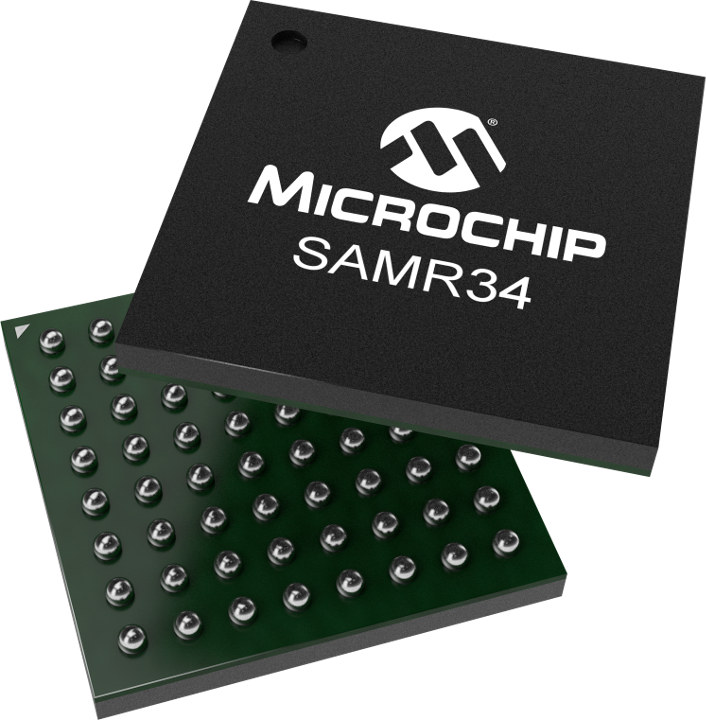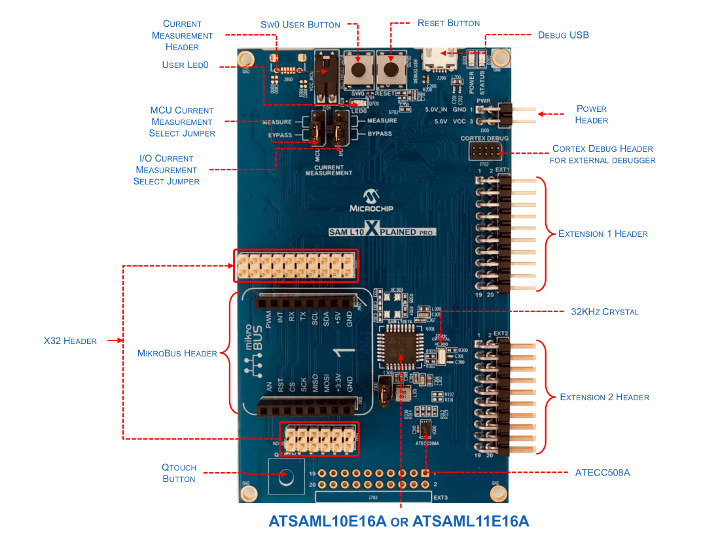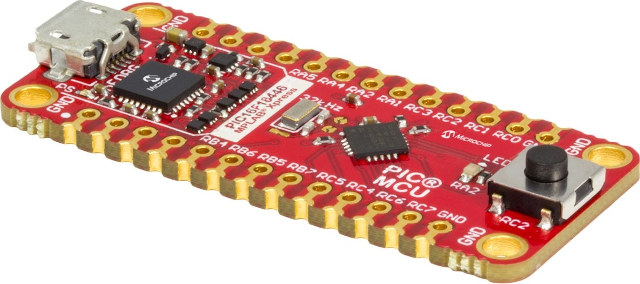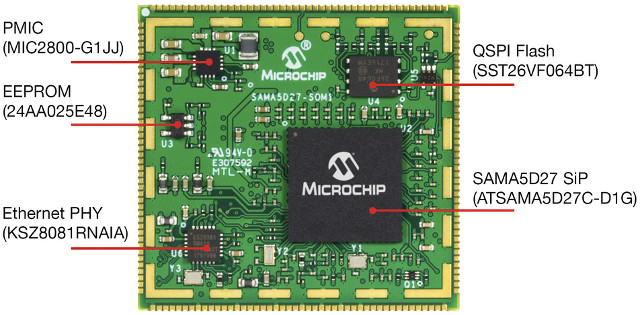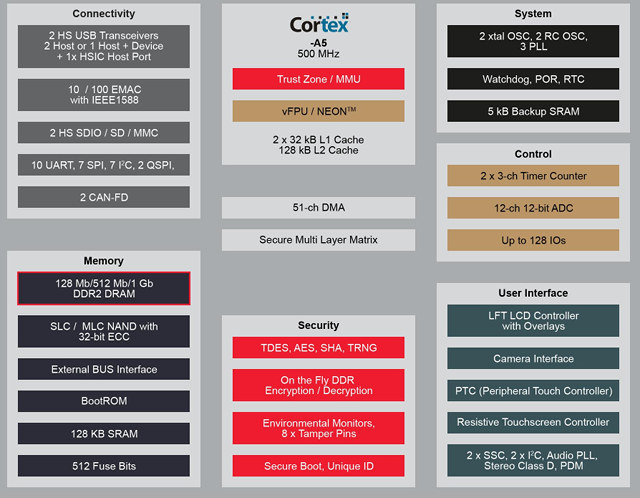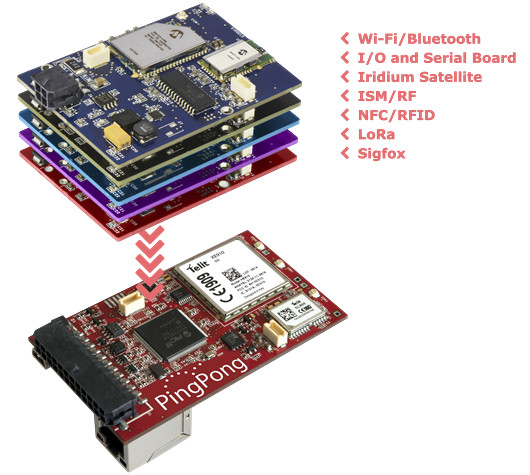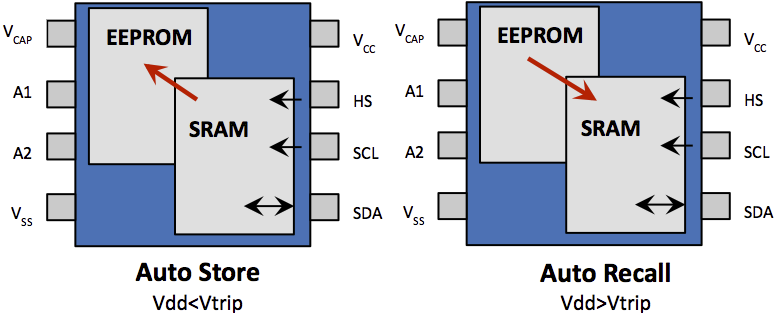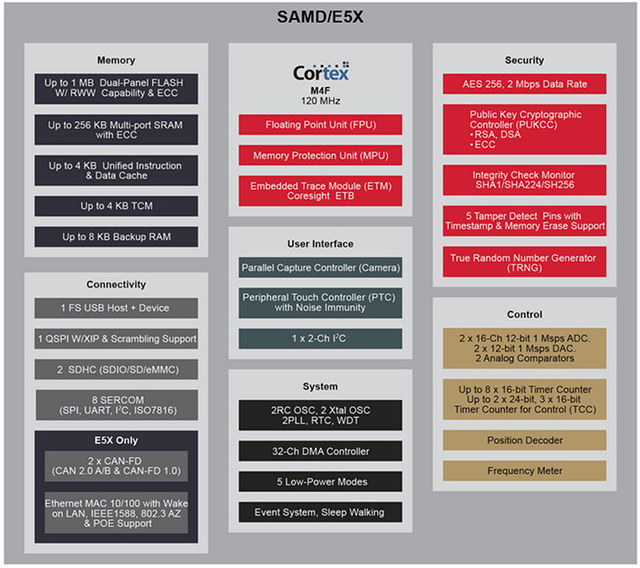Microchip has been offering RN2483 & RN2903 LoRa modules for respectively 868 MHz and 915 MHz frequencies for several years, but the company has now announced SAM R34 and SAM R35 LoRa systems-in-package (SiP) that offer similar functionality in a much smaller form factor. Both SiPs integrate a Microchip SAM L21 Arm Cortex-M0+ based MCU,a sub-GHz RF LoRa transceiver operating from 862 to 1020 MHz, and a software stack. That means you don’t need different SiP depending on the region, and the only difference between SAM R34 and SAM R35 is the latter does without a USB interface for lower cost. Microchip SAM R34/R35 key features and specifications: MCU – Arm Cortex M0+ MCU @ 48 MHz System Memory – Up to 40 KB RAM including 8KB LP-RAM Storage – Up to 256 KB Flash for application code and stack Wireless Connectivity 862 MHz to 1020 MHz coverage Up to 20 […]
Microchip Unveils SAM L10 & SAM L11 Arm Cortex-M23 MCU Families with Arm TrustZone for Armv8-M
Microchip has recently announced new SAM L10 and SAM L11 Arm Cortex-M23 MCU families, with the SAM L11 family featuring Arm TrustZone for Armv8-M that provides hardware isolation between certified libraries, IP and application code. SAM L10 & SAM L11 MCU Families Key features: Arm Cortex M23 Core @ 32 MHz Up to 64 KB Flash and 16 KB SRAM picoPower Technology less than 25 μA/MHz in active mode less than 100 nA in sleep mode Fast wakeup time: 1.5 μS Flexible power saving features Enhanced Peripheral Touch Controller (PTC) with improved water tolerance, noise immunity and responsiveness Security (for SAM L11 only) Chip-level tamper resistance Arm TrustZone technology Secure boot Secure bootloader Crypto accelerators Secure key storage Op amp ADC and DAC Package – VQFN32, TQFP32, WLCSP32, VQFN24, SSOP24 Microchip SAM L10 MCU achieved a ULPMark score of 405, or over 200 percent better performance compared to the nearest […]
Microchip Offers Free PIC16F18446 8-bit MCU Development Boards
Microchip announced several PIC and AVR microcontrollers with “Core Independent Peripherals and Intelligent Analog” in February with respectively PIC16F18446 family of microcontrollers, and ATmega4809 megaAVR microcontrollers, with the latter to be integrated in the next generation of Arduino boards. The company is now organizing a promotion for their PIC16F184xx product family where they give away a PIC16F18446 MPLAB Xpress evaluation board! Key features of PIC16F184 micro-controllers: High-precision 32 MHz internal oscillator 7 to 28 KB Flash program memory 512 bytes to 2 KB of SRAM 12-bit ADC with computation (ADC2), up to 24 channels 5-bit DAC eXtreme Low Power (XLP) with sleep currents down to 50 nA IDLE and DOZE low power modes Memory Access Partition (MAP) Device Information Area (DIA) Signal Measurement Timer (SMT) Hardware Limit Timer (HLT) Windowed Watch Dog Timer (WWDT) Peripheral Pin Select (PPS) Peripheral Model Disable (PMD) Configurable Logic Cell (CLC) Two comparators Numerically Controlled Oscillator […]
Microchip Launches $39 Industrial Grade System-on-Module with SAMA5D2 System-in-Package
Last fall, Microchip introduced four SAMA5D2 systems-in-package (SiP) combining the Cortex A5 processor with 16 to 128 MB DDR2 in a single package, and at the time, the company also offered ATSAMA5D27-SOM1-EK1, a fast prototyping and evaluation platform for the SiP that was designed with a baseboard and a soldered down ATSAMA5D27-SOM1 system-on-module. The kit was available for $245, and pricing for the SiP started at around $9 per unit for 5K order. The company has now started to offer ATSAMA5D27-SOM1 module separately with pricing starting at $39 each for 100 pieces order. ATSAMA5D27-SOM1 specifications: SiP – Microchip ATSAMA5D27C-D1G SiP with Cortex-A5 MPU @ 500 MHz, 128 MB DDR2 DRAM Storage Microchip SST26VF064BT 64Mb Serial Quad I/O (QSPI) flash memory for boot code (Linux kernel or RTOS) Microchip 24AA025E48 2Kb Serial EEPROM with EUI-48 Note Identity for the Ethernet MAC address Connectivity – Microchip KSZ8081RNAIA 10Base-T/100Base-TX Ethernet PHY for wired […]
SAMA5D2 Based SiPs Combine ARM Cortex-A5 Processor With Up to 128MB DDR2
Atmel SAMA5D2 ARM Cortex-A5 processor was released about two years ago with extended temperature range and lower power consumption compared to previous SAMAD5 processors, with the new SoC still targeting industrial Internet of Things (IIoT), wearables and point of sale applications. In recent years, we’ve seen companies packing main components into systems-in-package (SiP) with products such as Octavo Systems OSD3358 and Espressif Systems ESP32-PICO-D4 with integrate an existing processor with memory, storage, and/or PMIC. Microchip (previously Atmel) has now done the same for their SAMA5D2 processors with SiPs combining the Cortex A5 SoC with DDR2 memory. Four SAMA5D2 SiPs have been launched: ATSAMA5D225C-D1M based on ATSAMA5D22C MPU with extra SD/SDIO, QSPI, FLEXCOMs (2x), I2S, and timers (2x) and: 128 Mb (16 MB) DDR2 DRAM 90 Peripheral I/Os 196 BGA Package Designed for RTOS/bare metal development ATSAMA5D27C-D5M based on ATSAMA5D27C MPU with: 512 Mb (64 MB) DDR2 DRAM 128 Peripheral I/Os […]
PingPong IoT Development Board Supports Cellular Connectivity, WiFi, Bluetooth, LoRa, Sigfox, and More
Round Solutions, a supplier of products, services and concepts for industrial M2M and IoT markets, has introduced PingPong IoT development board with either Microchip PIC32MZ running an RTOS, or PIC32MZ DA running Linux, and equipped with a Telit modules for either 2G or 3G cellular + GNSS connectivity. The board can also support WiFi, Bluetooth, ISM/RF, NFC/RFID, LoRa, Sigfox, Iridium satellite, and serial interface thanks to a range of expansion boards. PingPong IoT board specifications: MCU / Flash RTOS version – Microchip PIC32MZ 32-bit Microcontroller @ 200 MHz, with 512 KB RAM and 2 MB Flash Memory + 4 MB external memory Linux version – Microchip PIC32MZ DA (Full specs TBA) Connectivity Cellular connectivity Telit xE910 module with 2G, 3G and/or 4G LTE (coming soon) Data GSM/GPRS – Uplink/Downlink: 9.6 kbps UMTS – Downlink: 384 kbps, Uplink: 384 kbps HSPA+ – Downlink: 42.0 Mbps, Uplink: 5.75 Mbps LTE – Download: 100 […]
Microchip EERAM Combines SRAM and Backup EEPROM into a Single Chip
Most micro-controllers comes with both SRAM volatile memory, and flash or EEPROM for non-volatile (persistent) memory, but Texas Instruments – and other companies – have been selling MCUs with FRAM (Ferroelectric Random Access Memory) and standalone FRAM chip, a non-volatile memory that delivers performance and power efficiency similar to SRAM, and much better endurance that either flash or EEPROM. You don’t see FRAM in that many MCUs and solutions, because it’s more expensive than having SRAM + flash, but some applications requiring ultra low power consumption and non-volatile storage write capabilities may benefit from the technology. Those include data logging, sensor networks, and batteryless applications. Microchip has also it own technology with EERAM, a non-volatile SRAM memory that includes a “shadow” EEPROM used to automatically backup data on power down with a small external capacitor providing enough power to save SRAM to the EEPROM. Once power is recovered (Vdd > […]
Microchip SAM D5x and SAM E5x ARM Cortex-M4 Micro-Controllers Launched with Optional Ethernet and CAN Bus
Microchip has just introduced two new families of micro-controllers based on ARM Cortex-M4F with SAM D5x and SAM E5x series sporting up to 1 MB of dual-panel flash and 256 KB of SRAM both with ECC support. Both families also support QSPI flash with XIP (eXecute In Place) support, features an SD card controller and a capacitive touch controller, with SAM E5x family also adding support for two CAN-FD ports and Ethernet. Microchip SAM A5x/E5x key features and specifications: MCU Core – ARM Cortex-M4F core running at 120 MHz with single precision Floating Point Unit (FPU) Memory – Internal memory architecture with user configurable Tightly Coupled Memory, System memory, Memory Protection Unit and 4KB Combined I-cache and D-cache; up to 256KB ECC SRAM, up to 1MB ECC flash Storage I/F – Quad Serial Peripheral Interface(QSPI) with Execute in Place (XIP) Support Peripherals Up to 2x Secure Digital Host Controller (SDHC) […]


